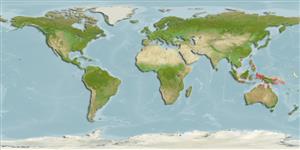>
Gobiiformes (Gobies) >
Gobiidae (Gobies) > Gobiinae
Etymology: Eviota: No etymology given, suggested by Christopher Scharpt: from Latin 'eu' for 'true' and 'iota' for anything very small, in combination 'truly very small' referring to it as being the smallest vertebrate at the time it has benn described by Jenkins (thus, making the suggestion by Scharpt plausible; maculibotella: Name from Latin 'maculos' for spotted and 'botellus' for a small sausage and apparently the origin of the English word pudding; referring to the spots on the male urogenital papilla that is reminiscent of the British pudding known as spotted dick, which is light brown with dark spots.
Environment: milieu / climate zone / depth range / distribution range
Ecologia
marinhas associadas(os) a recifes; intervalo de profundidade 0 - 8 m (Ref. 109221). Tropical
Distribuição
Países | Áreas da FAO | Ecossistemas | Ocorrências | Point map | Introduções | Faunafri
Western Pacific: Vietnam.
Tamanho / Peso / Idade
Maturity: Lm ? range ? - ? cm
Max length : 1.6 cm SL macho/indeterminado; (Ref. 109221); 1.5 cm SL (female)
Descrição suscinta
Chaves de identificação | Morfologia | Morfometria
Espinhos dorsais (total) : 7; Raios dorsais (total) : 8 - 9; Espinhos anais: 1; Raios anais : 8. This species is distinguished by the following characters: absence of the POP and IT cephalic sensory-canal pores; dorsal/anal fin-ray formula often 8/8; some of the pectoral-fin rays are branched; fifth pelvic-fin ray 20% or less of fourth pelvic-fin ray; under eye are 3 dark bars; first dorsal fin of male is filamentous; male urogenital papilla is smooth and tapered, peppered with small black spots (Ref. 109221).
Collected from fringing reefs, gullies with sand, encrusting corals, and algae and large bommie surrounded by coarse sand, coral rock, and algae, both habitats at 0-6 m depth (Ref. 109221).
Ciclo de vida ou comportamento de acasalamento
Maturidade | Reprodução | Desova | Ovos | Fecundidade | Larvas
Greenfield, D.W. and R. Winterbottom, 2016. Three new dwarfgobies from the western Pacific Ocean (Teleostei: Gobiidae: Eviota). J. Ocean Sci. Found. 22:28-40. (Ref. 109221)
Status na Lista Vermelha da UICN (Ref. 130435: Version 2024-2)
Ameaça para os humanos
Harmless
Uso pelos humanos
Ferramentas
Relatórios especiais
Baixar XML
Fontes da internet
Estimates based on models
Índice de diversidade filogenética (Ref.
82804): PD
50 = 0.5000 [Uniqueness, from 0.5 = low to 2.0 = high].
Bayesian length-weight: a=0.00692 (0.00284 - 0.01683), b=3.10 (2.92 - 3.28), in cm total length, based on LWR estimates for this Genus-body shape (Ref.
93245).
Nível Trófico (Ref.
69278): 3.0 ±0.3 se; based on size and trophs of closest relatives
Resiliência (Ref.
120179): Elevada, tempo mínimo de duplicação da população menor que 15 meses (Preliminary K or Fecundity.).
Fishing Vulnerability (Ref.
59153): Low vulnerability (10 of 100).
